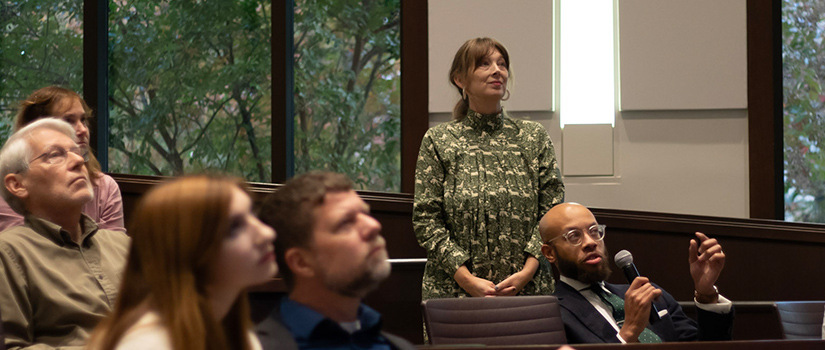University of South Carolina students are connecting with some of the world’s top constitutional scholars to learn more about the history and future of democracy.
Over the past two years, students have met researchers who brought unique perspectives about American history and its founding documents―topics often glossed over superficially in social media feeds, but which are vital to civic engagement.
It’s part of an event series coordinated by the Humanities Collaborative in the College of Arts and Sciences and designed to breathe life into the study of America’s founding documents.
“Instead of treating the founding period as a fusty, static era that we study as a series of museum artifacts, these programs explore what kind of intellectual or scholarly excitement early America could generate now,” said Holly Crocker, director of the Humanities Collaborative.
Enriching education
The programming is made possible by a $500,000 grant from the Mellon Foundation, an award supporting civic education programs at only 26 universities throughout the United States.
Crocker applied for the grant as USC faculty were starting to teach a series of courses rooted in America’s founding documents. With the Mellon Foundation’s support, she wanted to foster discussions between historians, political scientists, philosophers and others to enrich USC's teaching and research.
“The faculty who are teaching these courses need to have more intellectual resources and more opportunities for community,” Crocker said. “The teaching program is an intellectual endeavor that our campus is embracing.”
The grant has made a direct impact on the classroom. It helped instructors conduct research and present it at conferences, allowing them to bring original insights back to their students. “We were able to strengthen the interpretations and arguments in our research,” said James Risk, senior instructor of history.
The grant also supported a workshop that helped instructors from public universities throughout South Carolina learn proven ways to get students engaged with historical topics. One favorite was a primer on using role-playing to immerse students in history and help understand the perspective of the nation’s founders, Risk added.
In addition to research and teaching support, the program has brought a variety of speakers who touch on a common subject: the Constitution’s embrace of “counter-majoritarian” and “anti-majoritarian” institutions that prevent simple majority rule. For example, the Senate filibuster can block popular legislation, a president can veto a bill that has passed Congress, or the Supreme Court can strike down a law passed by a majority-led body.
“That can happen for ill or for good,” Crocker said. “A bad example of that is Jim Crow. A good example of that is civil rights.”
Bjoré Samard, a student in the Joseph F. Rice School of Law, said several events sparked his curiosity about American legal structures. One that stood out was a talk by Stephen Tierney, a University of Edinburgh professor and an advisor to the Scottish Parliament.
“He explored the significant constitutional differences between the United States and the United Kingdom and challenged conventional views on 'referendum democracy,'” Samard said. “These discussions offered me a fresh perspective on the legal issues at stake, highlighting the fundamental differences between our systems of government—differences often overlooked.”
In addition to Tierney’s talk several other scholars have spoken on campus since the fall of 2023. One of the first speakers in the series was Eric Slauter from the University of Chicago, who shared how pocket-sized Constitutions have encouraged civic literacy throughout American history, even before the Constitution was ratified.
Frances Lee of Princeton University also gave a talk about how the structure of congress forces bipartisan collaboration―an example of how counter-majoritarian structure can work well.
Bruce Ackerman, a Yale University scholar, discussed the democratic challenges resulting from a largely online country. While he outlined the problems that this poses for democracy, he challenged the students to find solutions.
The grant has generated a surprising amount of interaction with students, Crocker said. Last spring, the Mellon Grant supported a debate with USC’s Lincoln-Douglas Society on the topic of free speech, which ended with a vote in which students overwhelmingly supported free speech on college campuses.
What’s Next
The Humanities Collaborative will host multiple speakers in the Spring 2025 semester to continue these constitutional conversations.
Jedediah Purdy, a Duke University professor and the author of Two Cheers for Politics: Why Democracy Is Flawed, Frightening ― and Our Best Hope, will speak March 3. Later that month, Derrick Spires of Cornell University will speak about early African American “print culture,” such as newspapers and pamphlets, and the role they played in the new republic. Another debate with the Lincoln-Douglas society is in the planning stages, too, Crocker said.
In the 2025-2026 academic year, the grant will sponsor a conference as a capstone on the project.
Crocker saidthe event series already is helping to build on the university’s scholarly work with the humanities, showing how documents from centuries past can resonate with students today. Just as importantly, she said it is making students excited about participating in civic life and taking a constructive approach toward solving problems through the democratic process.
“We can't assume that because we've always loved the Constitution as Americans, that that will continue naturally,” Crocker said. “This is part of our educational mission, to convey to students that these documents and this tradition of democracy are important.”
Samard agreed.
“If we aspire to be an informed and engaged society, one that values civic virtue and the responsibilities of citizenship, then events like these are essential,” he said. “At their core, these events are a testament to the power of shared learning to bring people together in hopes of fostering a better citizenry.”
